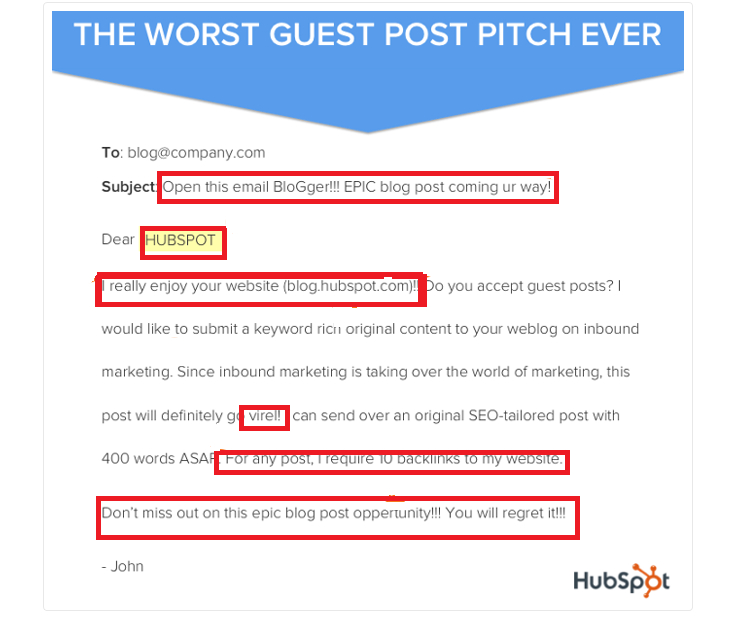
Imagine this for a moment: you are a very busy blogger and every day you wake up to an inbox filled with hundreds of emails from random people who are pitching their wonderful articles.
You grab a cup of coffee, sit down in front of your computer, open one of those emails and you see something like this:
“Hi, Sir.
Let me write you today to tell you how amazing I am and how your life will not be able to go on unless you feature my amazing and perfect article on your website.
Of course, I will include at least 25 links to my own amazing website, you readers will be amazed at how good I am!!
Also, I specifically need you to do it today or tomorrow at the latest, because I need it and I am awesome.”
Well, I might have exaggerated a little bit (ok, a lot!), but I wanted to emphasize a few things – I think you got the picture, right?
So what should the blogger do? I bet he will say something like:
“Errrr, what was this person even thinking?!” and then I bet he will immediately delete that email.
Here is a great example of a really bad guest blogging pitch (from the HubSpot blog) – I have highlighted in red all the terrible things that you should never include in your email if you want to actually have your article featured by the website you are pitching to:

What are the problems with this guest blogging pitch? Let’s take them one by one:
- The email subject sounds spammy (please, please, stay away from those!)
- The sender did not bother at all to get a little bit personal (like trying at least to research the name of the editor)
- The opening phrase is… well… bad (“I really enjoy your website”???? Come on!)
- All the misspelled words, my God!
- The sender started requiring thing even if their article idea was not even approved yet! (because with guest blogging it’s all about them, right? WRONG!)
- A seriously bad closing phrase!!!! I am sure the only thing that the editor regretted at that time is opening that specific email!
So are there any official rules of a successful guest blogging pitch? Well, it is actually the same as in any other sales interaction: you are selling yourself and your article ideas and the blogger or the editor is your potential client.
But to save you any overwhelm, here they are: the golden rules of a guest blogging pitch, collected right from the source (the busy star bloggers everyone is trying to impress).
1. Once you know what website you want to pitch your article to, start doing your research.
The worst approach is to send a blind pitch, without knowing anything about the blogger and what type of content he is interested in.
First, you have to very carefully read all the guest blogging rules they have (if any).
Then use the search box on their website to see what they have already published on your topic.
Study the format of their articles (are they short or long? Do they seem to publish a lot of “How to” posts? Do they seem to love lists or maybe infographics?).
2. Start to build a relationship with them before actually sending your guest blogging pitch.
Post comments to their articles, follow them and engage with them on social media.
If you do that for a while, when your name is going to pop up in their inbox they will recognize it and they will actually open your email.
3. Make the blogger care about you, as a human being, and he will be much more likely to consider your pitch.
Read their About page and try to find their name (if you can’t find it check their social media accounts or use Google research).
While doing that also note down some things you can include in your pitch email (like a hobby they have, a town they lived in, a recent trip they made or anything else they share with their audience).
This will show them that you took the time to actually know them.
4. Place yourself in their shoes.
Bloggers are not running their blogs to help people like you who want to write for them. Their goal is only to provide quality and regular content for their readers.
So in the first paragraph of your email, after shortly introducing yourself, tell them how you can help them bring more value to their audience.
Demonstrate those 2 things below and they will say YES:
- that you can write well (by inserting links to writing samples) and
- that you are focused on giving your best to their audience (show them you did your homework and you know exactly what their readers love to read about).
5. Just like any successful email marketing campaign, a successful pitch starts with the subject line.
When a blogger receives an email, he sees only two things: your name and the subject line.
This means that you need a subject line that will brag their attention and make them want to read more.
Research (like this http://frac.tl/pitching-publishers-best-practices) shows that 85% of editors open emails based on the subject lines.
Here is an example of a great email subject line:
“ Statistics show that 75% of brands promote their products on Facebook – guest post idea on how to make your brand stand out from the crowd” (specific, to the point, article idea included in the subject line)
And a not-so-great one:
“Guest Posting Inquiry” (general and… boring!)
6. Demonstrate respect for them and their time and make it really easy for them to say “Yes”
First of all, give before you ask. Don’t include any demands on inserting links to your website or promoting your freebie.
Wait until they say yes and them you can also cover this part. Right now it will only make you look greedy and we don’t want that.
Also, any blogger or editor is very likely to delete a pitch if it includes spelling and grammar errors, so double check your email before sending it.
Let them know that you are flexible and open to change the proposed headline, featured image or anything else in the article if they want.
And take care of all the necessary formatting and the blogger/editor will love you for it and will want to work with you for other future guest posts.
7. Include 3-4 article ideas in your pitch.
This will show them that you are full of ideas and willing to make this work.
8. Keep it short.
Have I mentioned bloggers are very busy people? 🙂
If they open your email and see a long page of words that could basically make an entire blog post they won’t read it (according to research 50% of them admit this).
So what you should include?
- Your short introduction
- Why your writing would be relevant to our audience
- A list of 3-4 article titles or ideas (including one takeaway for each of them)
- A short closing line (and please, don’t forget to thank them for their time!, Be polite.)
Of course that, even if you do your best in terms of researching and carefully crafting your pitch email, they might not answer back or they might say they are not interested.
Does this mean that you should never send them another pitch again? Certainly not! They said no to your specific article ideas, not to you, as a person.
So don’t be afraid to pitch again, with a new idea. Go again to step 1 and perform even a deeper research on their content and repeat the process.
Now you’ve all it takes to wow a blogger or editor. You just have to use everything strategically to show them what you’ve got!
If you have any additional questions on guest blogging pitches I can’t wait to read them in the comments, so don’t be shy.
Also, if you know anyone who would benefit from reading this feel free to share.
